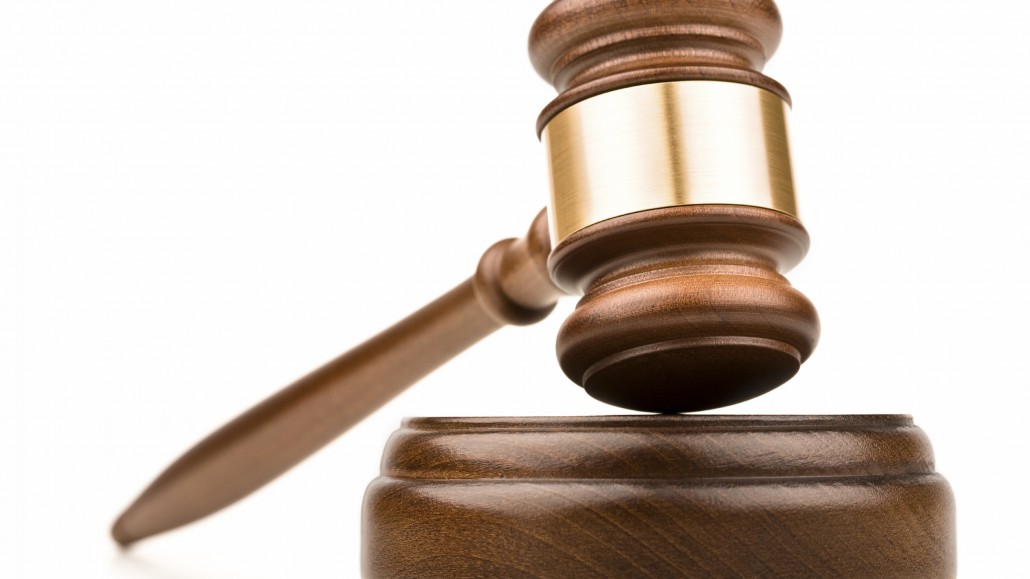Washington Bar Association Honors Judge Eric Christian
Esteemed Jurist Receives the Ollie Mae Cooper Award
By Barrington M. Salmon
A packed auditorium of family, friends, colleagues and admirers celebrated with DC Superior
Court of Appeals Chief Judge Eric T. Christian recently as he received the Washington Bar
Association’s prestigious Ollie Mae Cooper Award.
The award – named after one of the first African-American women in the country to start her
own law practice – is bestowed on those in the legal profession who demonstrate exemplary
leadership, outstanding service, and who also enhance the image of the legal community at
large.
The 37th Annual Ollie Mae Cooper Award ceremony took place at the Howard University
School of Law in Northwest DC and also featured American University Washington College of
Law Professor Angela J. Davis who delivered the 35th Founders’ Lecture. Davis, an author and
former director of the DC Public defender Service, is an expert in criminal law and procedure
with a specific focus on prosecutorial power and racism in the criminal justice system. Her well-
received discussion of the crisis of mass incarceration in the United States spotlighted
prosecutors’ role in exacerbating the problem, and she asserted that it’s their ethical duty to take
affirmative steps to end it.
Speakers lauded Christian, for among other things, bringing honor to his profession, being a
gentleman, exhibiting the traits of a principled and visionary leader and also for working
diligently towards and ensuring “a fair and transparent court system with access and justice for
all.”
“You could not honor a more fitting person. You keep giving,” said Judge Merrick Garland,
Chief Judge of the US Court of Appeals, DC Circuit. “I look on him with awe. He’s a nationally
recognized leader in the difficult art of managing a complex urban court.”
US District Court Judge Emmet G. Sullivan, while effusive in his praise, spoke of Christian’s
decade’s long career on the bench and his indispensible role in ensuring fairness and justice.
“He’s been chief judge for three successive terms and has the reputation and success of a
judge who has the ability to discharge his duties, impart justice fairly and be respectful of
litigants in the pursuit of justice in a manner that promotes confidence in the system of justice,”
said Sullivan. “He knows first-hand of the DC Court’s (role). The court has an obligation to the
community. Courts should reach correct conclusions for the correct reasons.”
“I firmly believe that Ollie Mae Cooper would have a bright smile on her face. He’s a worthy
recipient of this award. Congratulations, my friend.”
The Hon. Fern Sadler, an Associate Judge in the DC Superior Court, said she and her
colleagues were excited that one of their own was being recognized in that way xenical 120.
“He’s very deserving of this honor. He’s actually been very active and for that, we’re grateful,”
she said. Moderator Karen E. Evans had the crowd in stitches when she stood up to pay tribute to
Christian.
“I feel like everything I intended to say about Chief Judge Washington people have already
said,” she noted. “As my sixth-grade teacher told me, ‘Water seeks its level.’”
Evans, president of the Washington Bar Association and a prominent DC medical
malpractice attorney and partner with the Cochran Firm, recounted the observations and
reactions of Christian to them.
“What I learned: decent, human being, nice guy, sports fan (just bought season tickets to the
Wizards), progressive, wry sense of humor, great family man, approachable, very humble,”
Evans said. “I saw him at the ‘Justice or Else’ March and he was surprisingly low key … he’s our
leader, he’s our role model.” Christian, still looking a little surprised, told the audience that his wife, Sheryl, family,
mentors, staff and a wide circle of people around him who nurtured him and allowed him to
flourish were equally responsible for his success.
“I hope you can recognize how surreal this feels,” he said. “I’m flattered and humbled to be
part of this group of esteemed individuals. This is a great honor bestowed on me. I have not
gotten here on my own. I should switch places with my wife who embodies Cooper’s attributes.”
The bonhomie of the evening shifted during the lecture as Davis offered impassioned
remarks about a broken, flawed criminal justice system that incarcerates the most of its citizens
of any country in the world.
“There is a crisis in the criminal justice system,” Davis intoned. “ … Ten years ago, (Supreme
Court Justice) Anthony Kennedy decried the harsh penalties, misspent resources and
punishments that were too severe, which (consigned) people to long mandatory-minimum
sentences. He said there was no wisdom, they were unnecessary and unjust.”
“And for (former US Attorney General) Eric Holder, his greatest priority was a review of
sentencing. He consistently spoke out against sentencing disparities and other flaws.”
The US, Davis said, has the highest number of people behind bars in the world, surpassing
countries like China and India, which each have well over one billion people in each nation.
Currently, there are 2.2 million people in prisons and jails in the US – 25 percent of all the
people imprisoned around the world – with an additional 4.7 million people on probation or
parole.
The financial cost to the country every year? $80 billion, not counting the social, emotional
and physical toll to those imprisoned and the families they leave behind.
The unwarranted racial disparity is stark, Davis said. Black men are six times more likely
than whites to be arrested and incarcerated and one in 10 of every black men are in prison or
jail in any given day.
While judges used to have a great deal of discretion in terms of sentencing but that has now
dropped to prosecutors.
“We must act and end mass incarceration. We must act with urgency to change this unjust
system,” she said. “People are locked up for decades and it saddles them when they leave
prison. Prosecutors have great power and discretion to take the most direct steps.”
America, Davis added, has the dubious distinction of having five to eight times more people
in prison than any liberal democracy in the world. The federal justice apparatus has ballooned
800 percent in the past 30 years because of mandatory-minimum sentencing laws and the War
on Drugs and anti-drug abuse laws have landed first offenders behind bars for five to 10 year
minimums. President Bill Clinton in 1994 spearheaded legislation that lowered paroles and
increased sentences and he also introduced the “three strikes” law.
The growth in the criminal industrial complex exploded in the 1990 and some numbers – 35
percent of felony filings and prison admissions – are completely driven by prosecutors.
“He recently admitted that his laws added to the incarceration rates,” Davis said of Clinton.
“The sentences are extreme, overly punitive and irrational. People have received decades, even
life. And prosecutors have been involved. They got laws to put people in prison. Prosecutors
had the option to charge or not to charge. The final decision belongs to the prosecutors.”
“Crimes recommended by the police be (foregone) altogether. It’s totally within the discretion
of the prosecutor. Ninety-five percent all criminal cases are resolved by guilty pleas. Prosecutors
control almost the entire criminal justice system.”
It’s easy for prosecutors to pile on charges and Davis cited the case of a young man who
lived in a housing project in Mobile, Alabama who arranged a meeting between someone he
knew and a drug dealer. He got $1,500 for his poor decision. He was charged with conspiracy,
possession, possession with the intent to distribute. He chose to go to trial and although it was a
non-violent incident, he was sentenced to three life terms without the possibility of parole for
introducing a person to a drug dealer.
The other people involved testified against the young man and received more lenient
sentences. The drug dealer received a seven year, 10 month sentence. President Barack
Obama commuted his sentence after he served 21 years in a federal prison.
“In what universe is that justice?” she asked.
Prosecutors, she said, must aspire to be better, be ministers of justice, not justice advocates.
“The goal should not be to win cases but justice must be done. They must seek justice and
act with balanced justice, with appropriate severity, exercise discretion,” she said. “Prosecutors
are not a case processor but a problem solver. They should stimulate remedial action. They
have a moral and ethical responsibility to take us out of this.”
Among Davis’ solutions: drastically changing charging procedures; increase the use of
diversion programs; develop robust restitution programs; use of a continuum of options,
including community service; drug treatment programs; and expanding alternative programs to
include non-violent felons, drug offenders, those convicted of committing property crimes and
others who play minor roles in crimes.
“Prosecutors play an important, essential role in criminal justice. They must do it fairly,
equitably and with compassion,” Davis concluded. “They shouldn’t just lock people up. They
should exhibit humility, not arrogance and use their abilities to do good. Prosecutors have been
given extraordinary power and to whom much is given, more is expected.”


